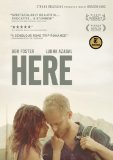| Reviews & Columns |
|
Reviews DVD TV on DVD Blu-ray 4K UHD International DVDs In Theaters Reviews by Studio Video Games Features Collector Series DVDs Easter Egg Database Interviews DVD Talk Radio Feature Articles Columns Anime Talk DVD Savant Horror DVDs The M.O.D. Squad Art House HD Talk Silent DVD
|
DVD Talk Forum |
|
|
| Resources |
|
DVD Price Search Customer Service #'s RCE Info Links |
|
Columns
|
|
|
Here
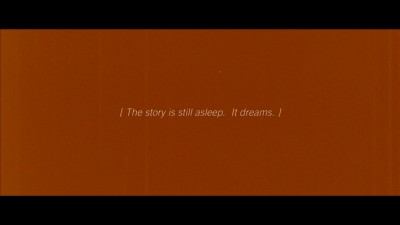
Watching Here, the debut fiction feature by documentarian/music video director Braden King, makes you ponder the mysterious process that a filmmaker must go through after they experience their initial flash of inspiration. There is, one imagines, a striking image or sequence that comes to them -- something not yet quite formed that they long to put up on that screen before your eyes to engage and move you, a deep and long-lasting motivation for all the intensive, difficult work that follows, creating an entire movie that makes good on the promise of that founding flash. Judging by how pretty King's film looks -- how sharply, evocatively composed, how beautifully lit -- he wasn't lacking for the inspiration, at least not visually. But when it comes to the much less automatic and free, much more cumbersome and forbidding perspiration part -- that long, frustrating patch where the vision is fleshed out, moment by moment and detail by detail, into two or so meaningfully structured hours of a fully realized world also containing, usually, fully realized characters involved in a situation or story with some urgency or resonance -- King lacked either the chops or the stamina. There is a jarring disconnect in Here between the awe and depth its admittedly beautiful images telegraph and its absolutely anemic, startlingly bland and vague story, which tries and fails to stumble to life when the pictures actually start moving.
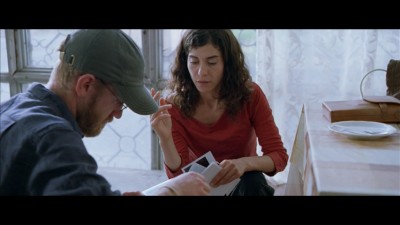
Perhaps it's telling that the more interesting of the film's protagonists is a photographer, a young Armenian woman named Gadarine (Lubna Azabal, Incendies) who has left her poor, traditional homeland, not bursting with opportunities for a young woman, to go out in the world and become famous in a way, having her work shown in Paris galleries, etc. Gadarine has now returned to her troubled, humble home, to her proud parents who nevertheless guilt-trip her mercilessly about straying from her roots, and her brother, who spends his downtime from military service rebuking his prodigal sister and hacking cell phones for a living. Gadarine meets American surveyor Will Shepard (Ben Foster, The Messenger), a fellow guest at the hotel she's staying at in lieu of her family's small apartment, when she translates his breakfast order into Armenian for him. There is, shockingly, no romance; it's as if the film has predetermined that this is its couple, so all of a sudden they're together, with Gadarine inviting herself along to take some photos with Will when he goes on one of his several-day outings, journeys he makes to get a real-life lay of the land for some GoogleMaps-like entity he works for. They get into minor scrapes (the car breaks down; a border crossing threatens to go badly, bureaucratically speaking; Will's laptop, an essential tool for his work, breaks) and get to know each other, mostly through revelations that, while as well-delivered as possible by Azabal and Foster, are puzzlingly unmotivated. For example, when Will verbally spills the story of where he's from and his childhood while they're on a walk somewhere, it seems to go on forever; it's clumsily written, full of details that, while meant to have some psychological signification, seem both contrived and pointless, and we just wonder why this speech is going on. The same goes for most of the film's attempts at "conflict," which never go much of anywhere (however loaded the story may be with latent conflict, like the differences in cultures and language, or the rift between Gadarine and her family, that either get overlooked or are blurted out/skimmed over so trivially as to be almost insulting).
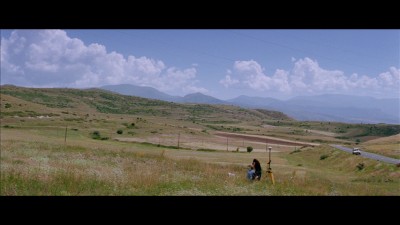
The answer, of course, is for the filmmaker's convenience; such expository dialogue, like the film's surfeit of lacquered-on regional pop music and last-resort editing strategy of jump-cut after jump-cut (the final rush of images is truly a bad idea, in case one had any lingering doubts about the film being a hopeless mishmash), are flimsy tape meant to hold together shapeless pieces that still, of course, fail to coalesce. It's painfully obvious that King cares much more about elements like "look" and "feel" than about his story or characters, which would be absolutely fine (and probably make for a much better movie) if he hadn't felt the need to parlay his visual/montage inspirations into a drama. But there the story and those characters are, constantly in the way, tripping him up, and he must dispose of them somehow. The hasty, clumsy way he does so makes it very apparent that his real interests lie more in more abstract, avant-garde, non-narrative film form, a fact driven home by the film's inexplicable interludes, in which chopped-up sequences from other filmmaker's short, experimental works are lovingly flashed before us as Peter Coyote's voice reads aloud from what sounds like a folktale or parable meant, we infer, to encapsulate what this photographer and this cartographer represent -- a lot of rambling about scientists vs. artists, the intuitive vs. the rational, the artistic, "photographic" take on a region vs. what the literal-minded, categorizing "mapmaker" sees (even more groan-worthy, this could be extended to the "female" and the "male," Will's too-rational man confronting Gadarine's free-spirited, irresponsible woman), all of which is terribly, transparently schematic. These patches of baritone self-indulgence seem meant to elevate the whole affair to something profound and near-mythological, but they fall far enough short to make some of it rather painful. This overripe abstract/allegorical material and the hobbled, faltering way the more straightforward story is told just cancel each other out; they both seem conjured on a whim, poorly thought-through or developed, and just left to sit there on the screen, clumps of clay still in need of much molding yet presented as the completed vessel.
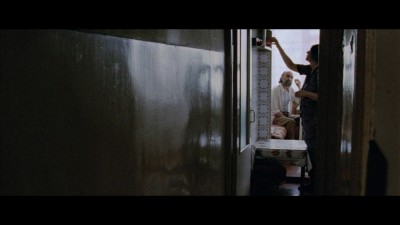
King is certainly capable of some nicely framed and composed images -- some of the plays on shadow and light, as when doorways create beacon-like frames within the frames of the darkened spaces around them, are really well-done -- but they fail the test that separates, say, a slideshow or photographer's monograph from cinema (even cinema that incorporates those media, like Marker's La Jetée and Apichatpong's Uncle Boonmee): they don't add up to anything, they have no unifying motivation or structure to make them cohere into a movie. Despite the film's being set in an only tentatively stable part of the world with a very troubled past (the Armenian people being an ethnic minority who suffered an unspeakable early-20th-century genocide), and containing characters of whom one could ostensibly say the same, it scarcely makes any difference; it's an abysmally wasted opportunity, given that (as, for one example, Atom Egoyan's Ararat demonstrates with much more vigor and interest) there are stories overspilling with complexity, subtlety, conflict, and contradiction to be told about Armenia, its history, and its relationship with the rest of the world. Perhaps the most damning thing about Here is that it offers up 360-degree panning shots of a stunning, unfamiliar landscape and lots of little glimpses of the kinds of lives that go on there (all more interesting than the ones we're half-focused on), but it just discards all the true cinematic beauty and interest that its setting hints at, instead using it as, in effect, mere backdrop, a pretext for an extremely conventional love story that could just as well (or, in this case, just as middlingly) have been told anywhere; the more nondescript the setting, the more suitable it would have seemed.
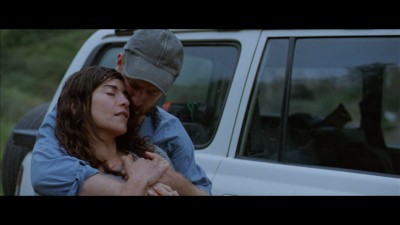
THE DVD:
The disc's anamorphic-widescreen transfer presents Here at its original theatrical aspect ratio of 2.35:1. The picture quality, encompassing the various textures of the interspersed 8 and/or 16mm abstract films as well as King and cinematographer Lol Crawley's super-35/digital-master-to-film footage, is quite good overall: colors and what grain there should be seem solid, present and accounted for, and there doesn't seem to be any aliasing or bad compression artifacting to speak of. There is edge enhancement throughout, but it's unpronounced -- visible only upon very close scrutiny, and not a significant distraction.
Sound:The Dolby Digital 5.1 soundtrack preserves very well the film's multilevel sound design, with all voices (frequently in Armenian, with optional English subtitles), background sound, and music coming through fully, clearly, and at the intended levels. No imbalance or distortion can be heard at any point.
Extras:--Eight purely-visual/non-narrative short films, made by a handful of international avant-garde filmmakers, which King excerpted for the Peter Coyote-narrated, "abstract" segments of Here.
--Image galleries compiling the Polaroids and 35 mm photos taken by "Gadarine" (Lubna Azabal) throughout the film.
--The film's theatrical trailer as well as trailers for other Strand Releasing titles.
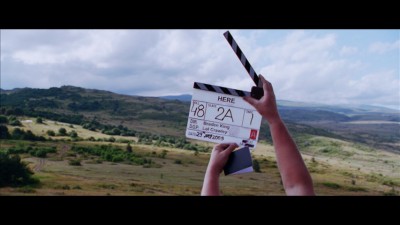
While often pretty to look at, Braden King's Here very quickly degenerates into a yawn-inducing postcard; its brand of photogenicity becomes repetitive with nothing motivating it, and it starts to veer into really superficial, tourist-y territory well before the end. King has never finds a way to integrate characters and/or story into his "poetic" visuals, and the film falters badly in its attempts at dramatic narrative. Its shoehorned-in attempts at profundity -- through fancy editing, inserts from avant-garde/abstract films, and gnomically written, portentously read voice-over narration by Peter Coyote -- are (there's no other word for it) pretentious; the banality of the film's central love story (whose cross-cultural/international implications and meanings are left virtually untouched in favor of some pretty pure middlebrow sap) cannot be made any more significant by dressing it up with landscape shots and grandiose, unearned pseudo-mythologizing. There are flashes of inspiration here and there; King does have a visual sense (his reluctant, desultory storytelling hints that he'd rather join the ranks of those filmmakers whose non-narrative, structure-and-texture-based works he quotes liberally as "illustrations" to accompany Coyote's voiceovers), and leads Ben Foster and, especially, the always-charismatic Lubna Azabal do their best with the leaden, expository speeches and whatever microscopic fragments of characterization they've been given to work with. But you realize not very far in that the film is going to sink under the weight of its own noncommittal vagueness, and so it does. It attempts to just connect the art-house dots, superficially borrowing a stark visual-composition strategy from Antonioni here or throwing in a dash of Kiarostami-like metafiction there, but that only serves as a painful reminder that those masters have plentiful ideas -- a genuinely idiosyncratic worldview, vision, curiosity, and all the accompanying aesthetic and narrative courage required to burn them onto the screen and into our consciousness. Conversely, if you scratch the surface of Here, there's nothing underneath; it has the trappings of an "arty," complex, deeply felt and thought-provoking movie, but lacking as it does the healthy, beating heart of imagination and intellect that pumps life into any serious film, it seems like nothing so much as a wax-museum parody. Skip It.
|
| Popular Reviews |
| Sponsored Links |
|
|
| Sponsored Links |
|
|
| Release List | Reviews | Shop | Newsletter | Forum | DVD Giveaways | Blu-Ray | Advertise |
|
Copyright 2024 DVDTalk.com All Rights Reserved. Legal Info, Privacy Policy, Terms of Use,
Manage Preferences,
Your Privacy Choices | |||||||









